From CEOs to Black Hawk chopper pilots, how these women rose to the top of their fields, while raising children
A government minister, a chopper pilot-turned-firefighter, a managing director, an assistant police commissioner. They all rose to the top while raising kids. How did they balance it?
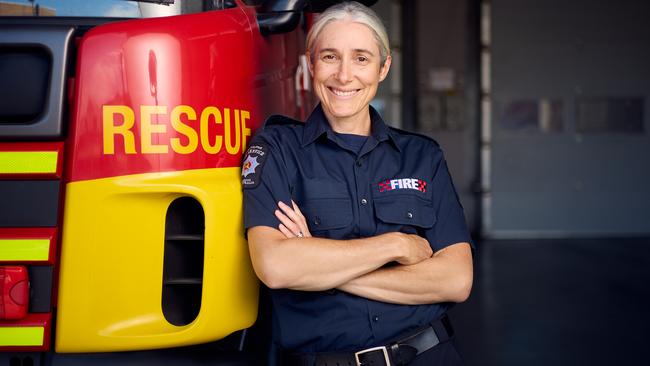
Lifestyle
Don't miss out on the headlines from Lifestyle. Followed categories will be added to My News.
Genevieve Rueger has flown Black Hawk helicopters for the nation’s counter-terrorism squadron and doused fires raging in burning buildings during her career.
But it was her first experience of maternity leave that was, in hindsight, “probably the most stressful thing I’ve done”.
She spent much of the first year of her daughter Kayley’s life parenting effectively solo while her husband was away for work.
Then, when she returned to paid employment it was like “adding fuel to the fire”.
“(At work) I would pine to be with my child and then when I was back with my child … I would pine to be back at work,” she says, the exasperation she must have felt still evident.
“I was really feeling the pull in both directions, feeling that stretch emotionally, physically and mentally.”
Sound familiar?
When Rueger explains this to me during our interview it is like she is also describing my life. I have taken two stints of maternity leave in the past four years and returned to work part-time. As they say, the juggle is real.
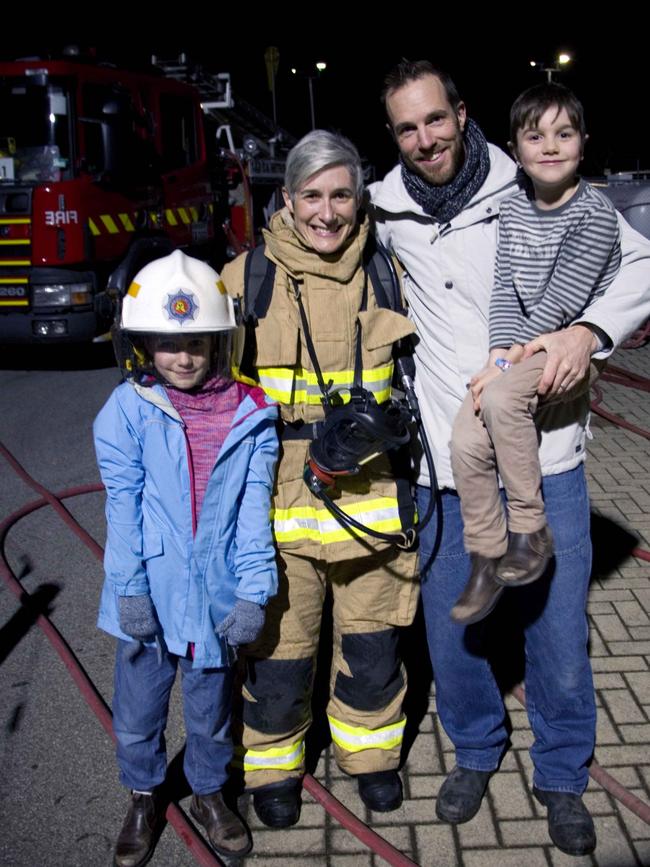
As I began navigating this transition that so many Australian mums go through I began to wonder how have all these women I see – running companies, succeeding in fast-paced demanding roles – managed to do it while also keeping children alive and happy? And especially if they chose to return to paid work in those all-consuming early years.
How have they not only returned to their career but continued to rise to the top of their fields while raising children into teens and adults?
So, I decided to ask them.
Perhaps unsurprisingly, there is no silver bullet (sorry).
The four women who share their stories with SAWeekend today – a firefighter, a government minister, a managing director and an assistant police commissioner – are clear that Super Mum cannot do it all, not all at once, and certainly not alone.
Grandparents, a partner who shared the load, or paid carers were all vital to their ability to return to paid work. They know income and workplace (in)flexibility are factors too. And they are honest that it’s also quite a lot of hard work and sacrifice. But if kids and career is your choice, then these working mums agree: It feels hard in the moment, but you’ve got to learn to play the long game.
ZOE & HUGO
Zoe Bettison was also a single parent who spent many nights sitting up with a crying baby wondering how she was going to make it all work. Every night in his early years, Bettison’s son Hugo was “restless” between 1am and 4am.
“One of the things I find really challenging is that people think you’re on a break when you’re on maternity leave. But that was the hardest I’ve worked and there were no breaks,” she recalls of the 24-7 demands of keeping a baby alive.
Today, Hugo is 13 and Bettison is a Member of Parliament and state government minister. She wouldn’t be there, she says, without a few things – chiefly the support of her parents and her now-husband … and coffee.
“The first day I dropped (Hugo) at childcare I got back in my car and burst into tears,” Bettison says of her return to part-time work when her son was six months old. “Then I went and bought a cup of coffee … I don’t think I’d had a hot cup of tea or coffee for about six months.”
At the time, Hugo’s dad Issac was living in Europe, where he and Bettison met in Prague while she was on holiday in 2008. Born in the African nation of Ivory Coast, Issac was not able to move permanently to Australia until Hugo was 5 and until then, Bettison was on her own when it came to the hands-on aspects of raising their son.
So in stepped her parents. Max and Amie Bettison, now aged 80 and 77, were uniquely placed to help, given they lived next door. A gate in the fence between their backyards made things even easier.
Bettison, now 50, concedes “not everyone has that level of support”, particularly the many migrants who live in her northern suburbs electorate of Ramsay.
It was the combination of paid childcare and the support of her parents that meant she could take the leap to run for parliament when her son was just 18 months old. Former premier Mike Rann was bowing out after representing the people of Ramsay for more than a quarter of a century, sparking a by-election in 2012.
“Opportunities like that come along once every 25 years and I said ‘It’s now or never’ and I went for it,” she says.
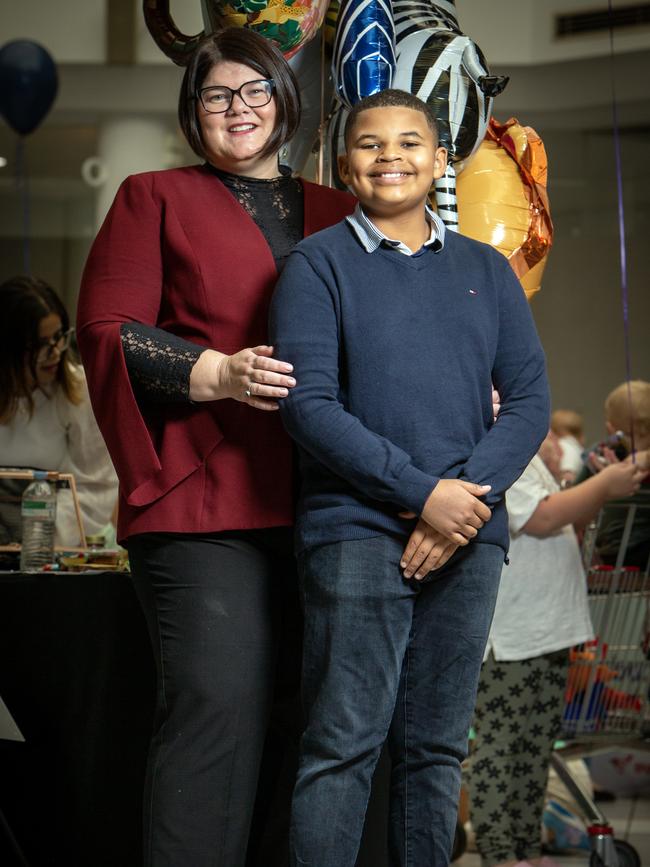
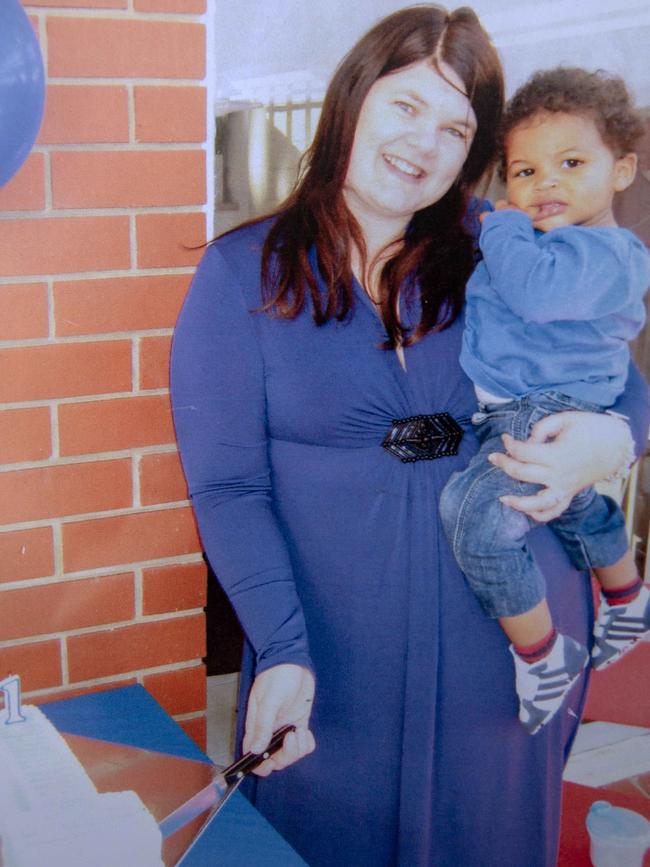
After a whirlwind six-week campaign Bettison became an MP in February that year.
Two years later, when Hugo was a preschooler, she was elevated to the ministry in the then-Weatherill government. “When I became a minister, I just missed him so much,” she remembers. “I did try to take him to some (ministerial) events … there was one time it was a complete disaster,” she laughs.
These days, Bettison leaves notes on the fridge for her son and husband about when she will be home. And she makes time every day to spend with Hugo, cooking or watching an episode of their favourite TV show.
“I’ll be the first to say that I haven’t dropped my child off or done pick up at school very often,” Bettison says. “My parents took a lot of that load. And Hugo did after school care.”
Issac now works full-time as a family relationships counsellor, but when Hugo was younger he was the one at the school gate and keeping on top of the cleaning and cooking.
“To me, it doesn’t matter if you’re male or female, we don’t put enough recognition into that work,” Bettison says. “I would like us, as a society, to have more recognition of the importance of running a home.”
Equally, she is hopeful of a “more mature” conversation around the choices families make about balancing work and child-rearing.
“I was brought up with a mother who worked. When I was younger my dad came home and looked after us for a few years,” she says. “(Later) I invested a lot in my education … and work was really important to me. But people have different motivations and different opportunities.
“People are saying ‘I’m not paid enough to go back to work’, and there’s a gap in men’s and women’s wages so that will naturally fall to women in general (to stay home).”
Bettison notes there have been increases in federal subsidies for childcare and greater willingness from employers to consider flexible parental leave and four-day work weeks. Her government also held a royal commission into preschool and out of school hours care.
But stigma remains. At the 2018 state election Labor lost power so Bettison, who held her seat, was no longer a minister. And someone told her, to her face, “now you can be a real mum”.
“It hurt so deeply because my relationship with my child is incredibly strong. I was like ‘What do you mean, what’s a real mum?’ For me it’s all about your child feeling confident, loved, secure … Sometimes women are not very kind to other women,” she says.
Last year Labor returned to power and Bettison rejoined the ministry, responsible for the event-heavy tourism and multicultural affairs portfolios.
Recently, Hugo surprised her by declaring that he too might like to be a politician. “For him to say that, I was just absolutely thrilled (by) the fact that he sees what his mother does and thinks that’s something he’d aspire to do.”
GENEVIEVE, KAYLEY & LACHLAN
“All of a sudden, when I had Kayley, it was this most amazing wonderful experience and that part everybody told me about, but not the sleep deprivation, or the anxiety over whether you’re doing the right thing,” Genevieve Rueger explains when she speaks to me from the Beulah Park MFS station where she now works.
Rueger, now 42, had spent years building a career as a pilot in the demanding and male-dominated Australian Army.
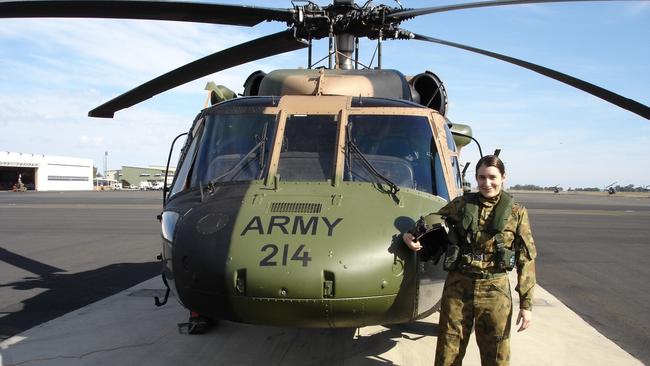
But when the specific stresses of new motherhood arrived in 2010 and her husband Mike – whom she met in the Army – was away doing the job they used to do together, Rueger admits she “really struggled”.
As someone who quite literally lives to serve others, the complete identity shift that often accompanies motherhood threw her too.
“I struggled because I felt like my purpose had been removed,” she says.
“And I know it’s not fair (to put that) on a little person, but … that’s the way I was thinking, I couldn’t help it. But actually that was the completely wrong way to think – all that had happened was I had a new purpose. I wish I’d had that clarity back then.”
Mike was away for work for nine of the 12 months after Kayley was born.
It was lonely, Rueger remembers, and especially difficult with a baby who didn’t sleep much. “It sounds really flippant to say that (maternity leave) is probably the most stressful thing that I’ve done, but I think it is,” she reflects.
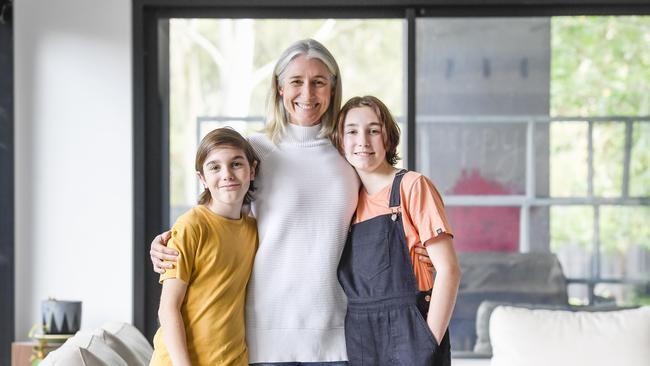
By the time Kayley was nine months old, Rueger was “craving” more adult interaction – despite feeling guilty and selfish about that – and decided the answer was to return to work. So she went back part-time at Sydney’s Holsworthy army base, where the family was then living. However, the effect was “like adding fuel to the fire”.
“Now I’ve got competing priorities,” she remembers thinking, describing that push-pull feeling of wanting to be in two places at once.
Two years later, Rueger went through it all again, after her son Lachlan was born in Toowoomba, Queensland, where they were living by 2012. Five weeks after his birth, the family moved back to Adelaide, where Rueger grew up, to be closer to the support of family, including grandparents.
Again, after about nine months of maternity leave, she felt that pull to return to work, “even more so” this time.
She had returned to work at RAAF Base Edinburgh but was no longer in a flying role, instead grounded doing project management.
She started on two days a week, but there was “judgment about that” too. Very soon she was asked to increase to three days a week, scrambling to add another day of childcare for Kayley and Lachlan – a scenario familiar to working parents the country over.
“I was working at least once, maybe twice a week until 1 or 2 in the morning to get things done,” she says.
With the benefit of hindsight Rueger says if “I had my time again I would not have done that to my family”, but when you’re in the middle of it, this kind of perspective can be difficult, if not impossible, to find.
So she pressed on, increasing to four days a week and moving into Defence Force Recruiting. She was also volunteering, doing reading time at the kids’ school and coaching team sport. Eventually she had to acknowledge something needed to change.
A chance discussion with a friend planted the seed for a career switch and in 2019 Rueger joined the ranks of South Australia’s Metropolitan Fire Service.
She is one of about 24 frontline female firefighters in Adelaide. She also continues to fly Black Hawks for a private company, doing aerial firebombing. Working two days and two nights attending fires and car accidents, she has purpose helping the community. Then she can spend days off focusing on family.
“I really have only found better balance more recently,” she reflects. “I had to learn to say no … to not think so much about other people’s expectations. That would have made a difference. I’ve now learned that lesson.”
WENDY-JAYNE & BAILEY
It was 1997 and Wendy-Jayne Williams had just got home from hospital with her newborn son. “I remember bringing Bailey home and he was sitting on the bed screaming his head off and I was thinking ‘Oh no, what am I going to do with this?’,” she laughs.
“It’s the most rewarding but also the toughest, most challenging and sometimes lonely thing I’ve ever done.”
Williams was a 33-year-old single mother at the time and stopping work to have a baby had not been in the five-year plan.
She had recently been made general manager at Jobs Statewide and the ambition was to be chief executive. Back then there was no paid maternity leave so, after just six weeks, Williams packed Bailey a bottle and brought him along to the office.
“I really had that sense of urgency of needing to hurry up and get back to work,” she recalls.
“I was really worried that other people would come along and want my role and that’s exactly what happened. I was only out of the workforce for six weeks … and somebody was already lining up for my job.”
Williams returned part-time for the first six weeks “with Bailey in tow” and “a receptionist who used to feed him a bottle while I was busy”.
When he was three months old, Williams returned to full-time hours and, within 12 months she was made acting chief executive. A year later, in 1999, she became chief executive and also established separate firm Excel Recruitment.
Bailey stayed with his nanna or uncle until he turned one, when Williams enrolled him at childcare.
“Without my mum I probably wouldn’t have been in the workforce,” says Williams, who sees many families today who are “totally reliant on childcare” and the financial burden it can impose.
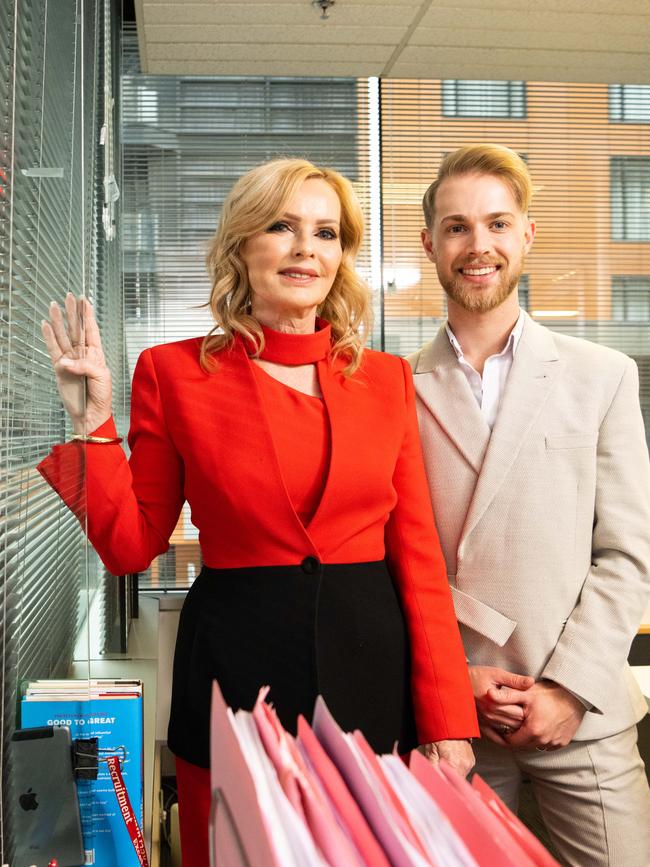
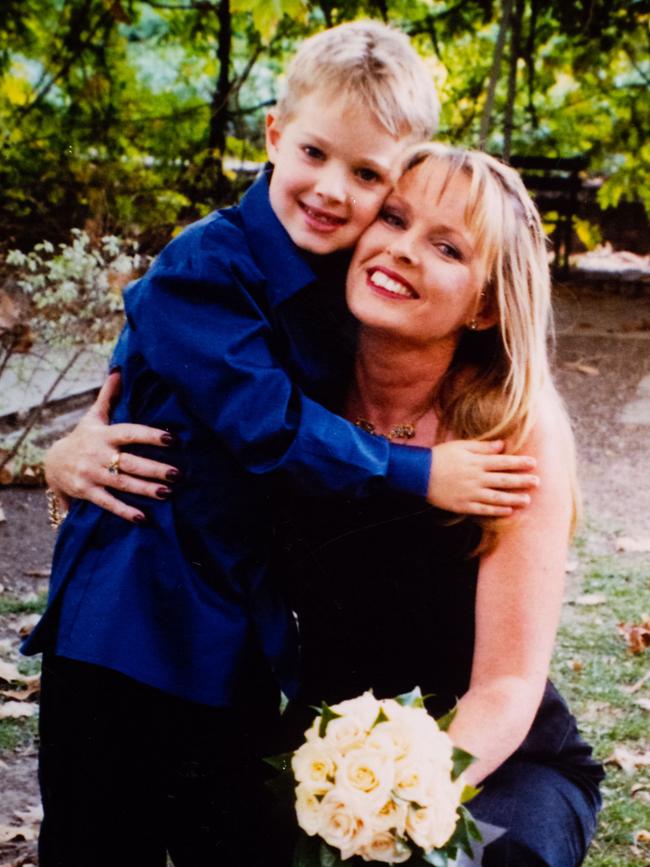
Now 26 and working in the family business, Bailey describes his mum as “the hardest working person” he knows.
Williams, 59, says “he always understood what I was trying to do” by putting in long hours to build “a better life”.
“Sometimes as mothers we have to make sacrifices and that can be a little uncomfortable and you’re filled with self doubt and guilt, but without pain there are no gains. I was fortunate to have a son that understood the long-term plan and future benefits,” she says.
Williams admits she missed many a school play and Bailey’s homework didn’t always get done, but argues school hours remain frustratingly incompatible with many parents’ working hours. She says parents need more support to stay connected to the workforce, including more accessible and structured before and after school care programs and cheaper childcare options.
“I wouldn’t get home from work until 8.30pm … then it would be straight home, cooking meals, repacking bags so when you get up in the morning you’re straight out the door,” Williams says. “It was nothing for me to be working until 3 in the morning writing reports, then getting up and going to work a few hours later.”
And on some nights Williams would be “standing over Bailey all night” monitoring his asthma symptoms.
“They were tough days, but I think adrenalin kicks in … and you stay in that mode for quite a few years,” she remembers.
At the time there was guilt when Williams would leave a crying Bailey at childcare or miss school pick ups.
“You feel guilty as hell coming to work, you get busy, and then something happens like mum’s ringing to say he’s just walked for the first time,” she says.
But the long hours meant she could provide not just for Bailey, but for her extended family. Their home in Paralowie, in Adelaide’s north, was always open to cousins, aunts and uncles, and Williams felt strongly that she did not want to return to the deprivation she experienced in her childhood, growing up with a single mother and six siblings in a housing trust home.
“If I decided to stay at home and not work and say that it was too hard … what future was there going to be for Bailey? I’d come from that so I was going to fight like hell to stay in the workforce,” she says.
“I’d worked for 10 years to … become CEO. I knew there was a possibility that that was a dream that was never going to happen if I chose to stay out of the workforce for a few years. Long-term it’s valuable because you don’t have that hiccup in your career, you keep progressing and that’s where the dividends come in. So today, I look back and I don’t feel guilty.”
NARELLE, RACHEL & SOPHIE
Today working from home is an option for more families trying maintain balance, but it was “unheard of” in SA Police when then-beat cop and new mum Narelle Kameniar decided it would be the perfect way to continue her career.
Admittedly “not one to sit still easily”, Kameniar was about four months into her maternity leave with firstborn daughter Rachel.
She had been pulled from frontline duties once she reached the start of her second trimester of pregnancy and was itching to get back on the job.
“(Rachel) would sleep a lot, so I offered to work from home, which was unheard of,” she says. “We didn’t have anyone working from home. This was back in 2001 … But one of the progressive thinking superintendents Graeme Barton said ‘Oh, absolutely, you can do that for my prosecution unit’. It was a way of keeping my head in the game.”
Under the pioneering arrangement, Kameniar worked from home for a few months before volunteering to also go back one day a week in court. Her husband Paul, a police officer too, was working shifts and able to stay home with their daughter.
“Had I not had the opportunity to work from home I would have just remained on maternity leave for a lot longer and I think my return to work would have been quite different, and potentially my career trajectory as well,” Kameniar says.

As it stands, that trajectory has taken Kameniar very high. In May, she was appointed assistant commissioner operations support services, and is responsible for five branches spanning firearms, state intelligence, licensing enforcement, forensic services and prosecution services. There are about 500 people under her direct command. Decades earlier, there was a time when she was responsible for just two children aged under two – and just as busy.
“It’s extremely demanding when they’re that young,” Kameniar recalls of the years after her second daughter Sophie was born in 2003. She was driven, but concedes it was a grind.
“A lot of the time I would work in the evenings. It was hard because it meant that I didn’t ever really have any down time … it was challenging, yes. But it’s a point in time.”
When she eventually returned to full-time work in the workplace, Kameniar remembers there was some relief because “instead of feeling like I need to get more work done, it meant my time at home was my own”. But even then, family had an impact on the roles she took on. She opted for shifts so the girls – now 21 and 19 – “weren’t in after school care five days a week” and so she could be there for school excursions or to help with reading in the classroom.
“I made very conscious decisions about the type of work I did that allowed me to have flexibility whilst the kids were young. I certainly think looking at my male colleagues, that they have moved through the ranks … a lot faster because they’ve remained full-time the entire time,” she admits.
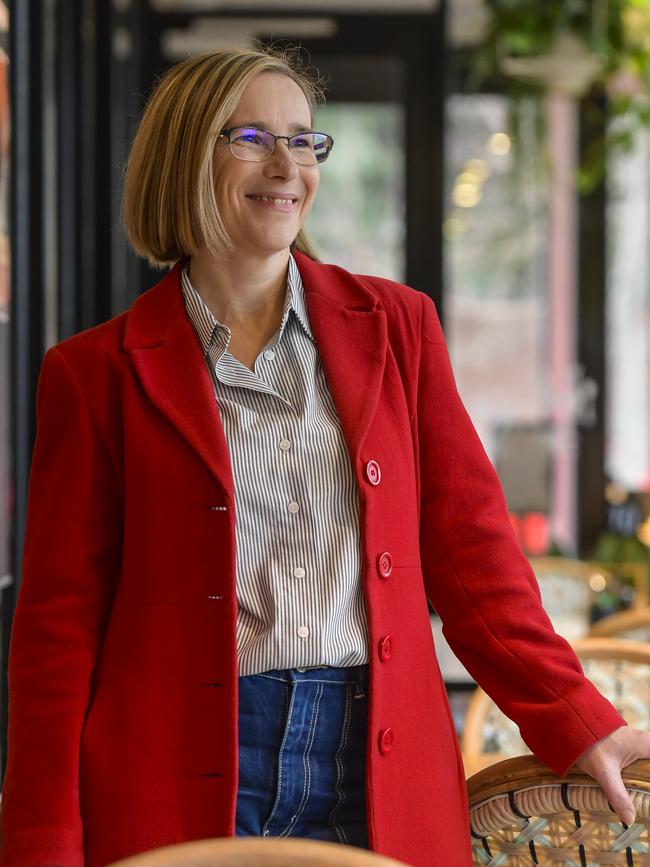
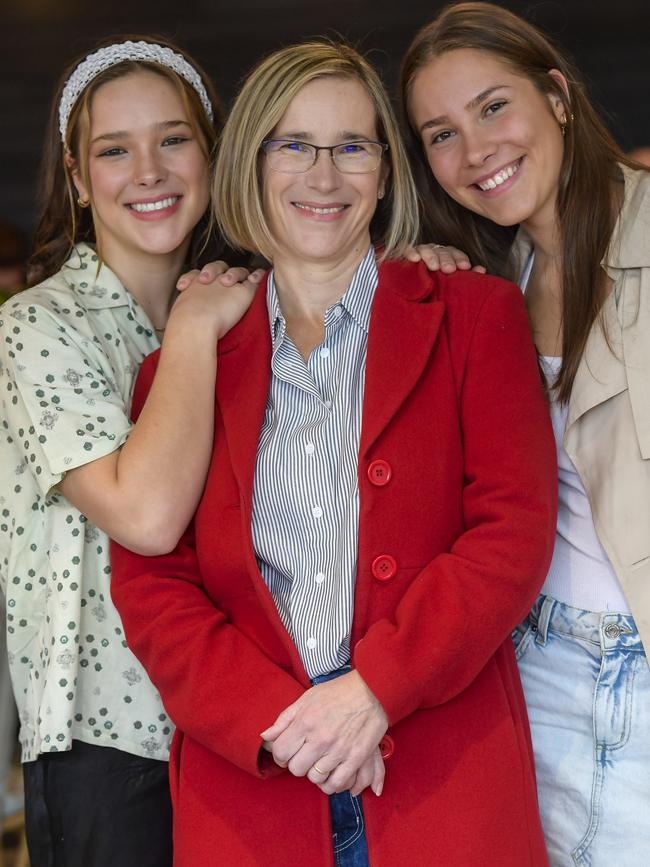
Like so many working parents, Kameniar too had those deflating moments dropping a crying child off at childcare – or crying herself at the thought of leaving her baby in the early days. And some days the realities, and risks, of being a police officer meant she hugged her girls extra tight at bedtime. “I was involved in a quite horrendous incident … I didn’t want my children to be concerned about mum going to work,” she says, adding she would have transferred from the frontline if her children had “been scared about mummy going into work”.
“Incidents can happen and it really brings home that you are a mum or a parent first and foremost,” she says.
While Kameniar, now 52, has had the support of a group of women whom she met in mother’s group more than two decades ago, she has also experienced judgment from other mums, or felt a reluctance from predecessors who struggled to smooth the way for the next generation. She has now made a point of sharing what she’s learned with other young women in the police force.
“It’s about looking for role models and not being afraid to ask other women how they’ve gone about what they’ve done or what they’ve achieved,” she says.
PLAYING THE LONG GAME
So for those of us in the trenches now, changing nappies and getting up to toddlers in the night, packing school lunches and bolting from the office at 4.59pm, what have we learnt from this?
Well, it feels hard because it is hard, so give yourself a break and ditch the guilt.
We made the choice to be working mums for a reason, but those reasons vary wildly between families, industries, income brackets and neighbourhoods. The reality is there will always be competing priorities and we might not ever feel like we achieve “balance”.
So it’s about mindset – deciding what our priorities are and learning to say no. At the end of the day, Kameniar reflects the wisdom earnt by all of the mothers who spoke to SAWeekend when she encourages us to be patient.
“You’ll go through different periods in your life, and your career,” she says. “It’s a matter of timing and not necessarily wanting everything straight away. It’s a long game.”
Originally published as From CEOs to Black Hawk chopper pilots, how these women rose to the top of their fields, while raising children



